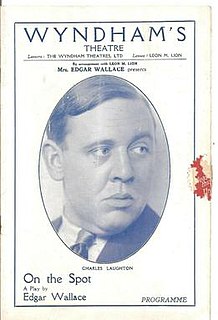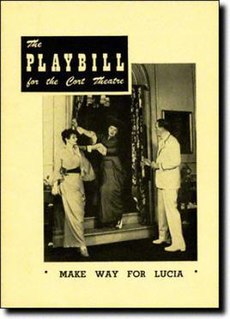State of the Union is a play by American playwrights Russel Crouse and Howard Lindsay about a fictional Republican presidential candidate.

Common Clay is a 1915 play by the American writer Cleves Kinkead. A social drama, it shows the relationship between a servant and a member of the wealthy family which she serves. When she becomes pregnant she finds herself ostracized by them. The play was controversial on its release, but enjoyed a lengthy run on Broadway. It was the outstanding success of Kinkead's career, and he struggled to repeat it with his later works such as Your Woman and Mine (1922).
Women Aren't Angels is a 1941 play by the British writer Vernon Sylvaine and featured Robertson Hare, Alfred Drayton and Judy Kelly in its original cast.

The Earl Carroll Vanities was a Broadway revue that Earl Carroll presented in the 1920s and early 1930s. Carroll and his show were sometimes controversial.

On the Spot is a 1930 Chicago-set play by the British writer Edgar Wallace. Wallace was inspired by a visit to the United States and, in particular, the Saint Valentine's Day Massacre. Known as a prolific author, he reportedly dictated the manuscript for the play in just four days. It was his greatest theatrical success.
The Mouthpiece is a 1930 crime play by the British writer Edgar Wallace. It was one of several theatrical failures written by Wallace following the enormous success of On the Spot, with a plot described as "flimsy".
The Old Man is a 1931 mystery play by the British writer Edgar Wallace. Its original production was staged at Wyndham's Theatre in London's West End for a ninety performance run. It is set entirely in the "Coat of Arms" tavern where a mysterious old man lurks in the background, reputedly an escapee from a lunatic asylum. The original cast included Alfred Drayton, Jack Melford, Harold Warrender and Finlay Currie.
M'Lady is a 1921 play by the British writer Edgar Wallace. It is a drama about a woman who tries to raise her daughter in high society, only for her husband to return from Broadmoor where he has been serving a sentence for killing a police officer. It was panned by theatre critics.
Smoky Cell is a thriller play by the British writer Edgar Wallace first staged in 1930. In America a group of detectives hunt down a notorious racketeer.
The Good Companions is a 1931 play by J.B. Priestley and Edward Knoblock, based on Priestley's 1929 novel of the same title about a touring concert party. The music was composed by Richard Addinsell.

The Doughgirls is a three-act play written by Joseph Fields. Producer Max Gordon staged it on Broadway, where it debuted at the Lyceum Theatre on December 30, 1942. The play is a comedy about three unmarried women sharing a room in an overcrowded hotel in Washington, D.C. during World War II. The Broadway production was a hit that ran for 671 performances and closed on July 29, 1944. It was adapted as a film of the same name in 1944.

The Druid Circle is a 1947 play by the British-American writer John Van Druten. It was staged in a run at the Morosco Theatre on Broadway from 22 October 1947, lasting for seventy performances. The cast included Leo G. Carroll and Ethel Griffies. A British university professor, frustrated to be working in a provincial institution, discovers a love letter written by one of his students to a girl. After humiliating them both, the Professor comes to realise too late the meanness of his actions.

Most of the Game is a 1935 comedy play by the British writer John Van Druten. Much of the play is set in New York where a British writer and his aristocratic wife have fallen out of love with each other, and started new relationships with a teacher's daughter and a Hollywood actor respectively. Complications ensue when the press gets hold of the story.

I've Got Sixpence is a 1952 play by the British writer John Van Druten. The plot follows two girls who are roommates and their contrasting relationships with men.

Make Way for Lucia is a 1948 comedy play by the British writer John Van Druten. It is based on the 1931 novel Mapp and Lucia by E. F. Benson. In a small town in pre-First World War England, a pretentious new arrival, Lucia, crosses sword with the local queen bee Miss Mapp.

There's Always Juliet is a 1931 comedy play by the British writer John Van Druten about an American architect who falls in love with an Englishwoman.
Old Acquaintance is a 1940 play by the British writer John Van Druten.
A Song of Sixpence is a 1930 British comedy play by the writers Ian Hay and Guy Bolton. Set in Scotland, it tells the story of three wives who rebel against their tight-fisted husbands.
Death on the Table is a 1938 thriller play by the writers Michael Pertwee and Guy Beauchamp. The plot revolves around American gangsters, Harley Street doctors and a murder that takes place on the operating table.

The Voice from the Minaret is a play by the British writer Robert Hichens. It premiered at the Globe Theatre in London's West End in 1919, with a cast including Marie Lohr, Arthur Wontner, Henry Vibart, Norman McKinnel, George Hayes and Vane Featherston. In 1922 it was staged on Broadway at the Hudson Theatre with Lohr and Herbert Marshall heading the cast, and Edmund Gwenn receiving the best reviews.










